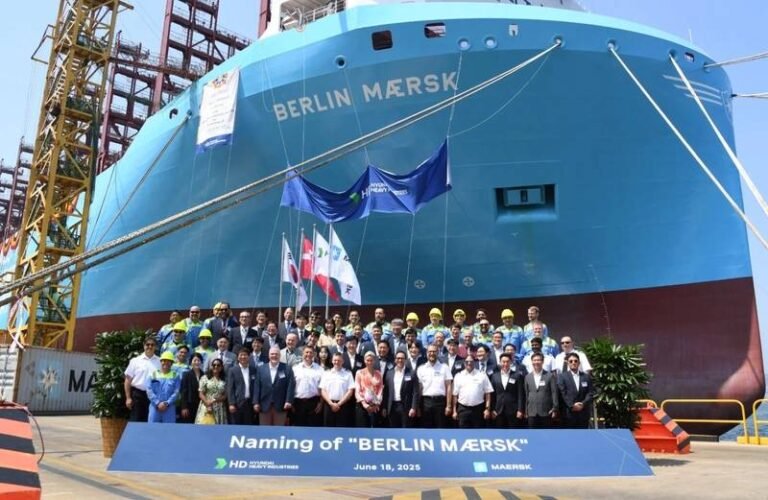Maersk Names First Dual-Fuel Methanol Vessel in New Series
Danish shipping giant A.P. Moller – Maersk has recently unveiled the first vessel in a series of cutting-edge container ships equipped with dual-fuel methanol propulsion. The new ship, named Berlin Mærsk, marks a significant milestone in Maersk’s commitment to sustainability and innovation in the maritime industry.
The naming ceremony for Berlin Mærsk took place on June 18 at Hyundai Heavy Industries’ shipyard in Ulsan, South Korea. This vessel is the 14th dual-fuel newbuild to join the Maersk fleet and is part of a series of six ships being built by HHI, with delivery scheduled for 2025. These state-of-the-art vessels will fly the Danish flag and operate on multiple fuel pathways to reduce carbon emissions.
Continuing Commitment to Decarbonization
Anda Cristescu, Head of Chartering & Newbuilding at Maersk, emphasized the importance of fleet renewal in maintaining a competitive edge in the shipping industry while also supporting decarbonization efforts. The Berlin Mærsk class represents a significant step forward in Maersk’s sustainable shipping strategy.
Following its naming ceremony, Berlin Mærsk is set to embark on its maiden voyage to Shanghai on July 7. The vessel will join Maersk’s AE3 service, connecting Eastern Asia with Northern Europe, showcasing the operational capabilities of dual-fuel methanol propulsion.
Innovative Design and Efficiency
The design of Berlin Mærsk closely resembles that of the previous Ane Mærsk class, with the main difference being a wider beam that allows for increased container capacity. This enhancement makes Berlin Mærsk the largest dual-fuel ship in the Maersk fleet, setting a new industry efficiency benchmark.
Ole Graa Jakobsen, Head of Fleet Technology at Maersk, highlighted the company’s ongoing efforts in innovation and optimization through the development of the Berlin Mærsk class. Building on the success of previous dual-fuel vessels, Maersk continues to lead the way in sustainable shipping practices.
As Maersk takes delivery of the Berlin Mærsk series, the maritime industry looks toward a future where environmentally friendly propulsion technologies play a crucial role in reducing carbon emissions and ensuring a more sustainable future for global shipping.

